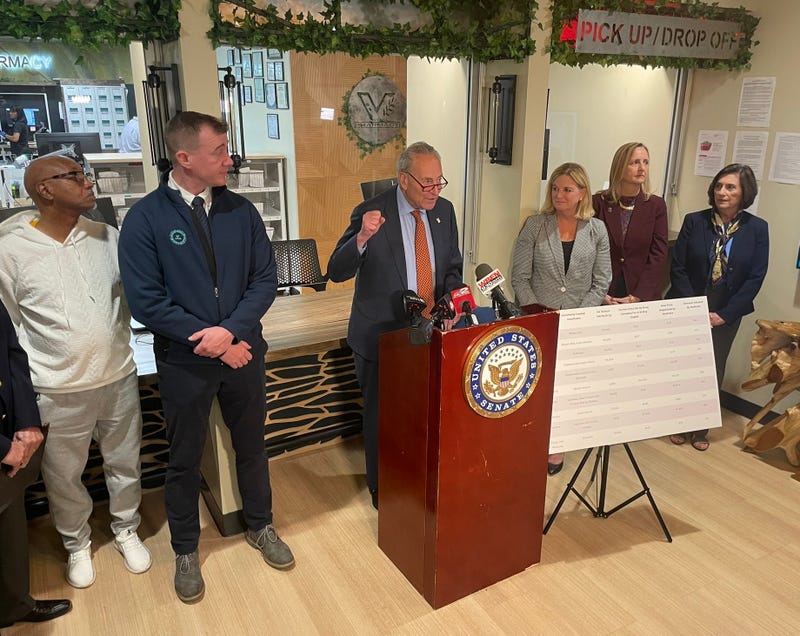
Buffalo, N.Y. (WBEN) - "Our seniors in Western New York can really breathe a sigh of relief."
U.S. Senate Majority Leader Chuck Schumer was in Buffalo on Monday visiting Vital Pharmacy on the campus of D'Youville University to reveal the next phase of lowering drug costs for seniors living in Western New York.
This next phase announced by Schumer will see a $2,000 annual cap on total out-of-pocket prescription drug costs for seniors on Medicare starting this January, as well as a new tool that allows seniors to break their drug costs into monthly payments, which they will need to opt in for if they would like to participate.
"That's a great thing, because if you have one drug and it costs $1,200 a month, it's terrible. But now it's much lower. That means people like Mr. [Lester] Callahan will never have to pay more than $2,000 to get your medications cheaper. So that's a very, very important thing," said Sen. Schumer on Monday. "Two years ago, you could be walking into a pharmacy and be told it's going to be $10,000 each year for this drug. What a horrible position to be in. Now it'll only be $167 a month. From $10,000 right up front to $167 a month. 261,000 seniors in New York will get these lower costs."
Schumer says seniors in America are paying higher prices than anywhere else in the world for commonly taken drugs. Nationally, 1-in-5 seniors recently reported forgoing medication, skipping doses, or cutting pills in half because they could not afford their drugs.
While an out-of-pocket spending limit of roughly $3,100 has been in place for 2024, it is lowering to $2,000 in January 2025. Once a senior spends $2,000 next year, their prescription drugs for the remainder of 2025 will be free of charge.
This will provide major protection to people with Medicare who currently have extremely high prescription drug spending. Before the Inflation Reduction Act, a single prescription could cost $10,000 out-of-pocket.
"It is really a dramatic reduction in the crisis, and it matters a great deal to our seniors," Sen. Schumer said. "I hear time-and-time again stories, people go to the doctor, doctor says you have a serious illness. The good news is there's a drug that will cure you or mitigate the symptoms. You go to the pharmacy and the good pharmacist has to say, 'Hey, that costs $1,200 a month.' That is really painful to people. What are they going to do? Not eat? Don't pay the rent? Don't ever go take a trip to see the grandkids? It's a very bad thing. So now we've had some real, real reduction. It's the first time we beat Big Pharma in a very, very long time."
AARP estimates that 261,000 New York seniors – the seniors who currently have the highest levels of drug spending – will benefit from the cap next year. By 2029, 1-in-10 seniors nationally are expected to see savings because of the cap.
Schumer also spotlighted the provision he helped deliver that will be starting in January that allows Medicare beneficiaries to break their drug costs into monthly payments.
For some seniors taking a very expensive drug, they could hit the $2,000 limit in January or February, which leads to a huge spike in costs for a short period of time that may be hard to budget for.
With the monthly payment tool, that same senior could pay their $2,000 obligation in equal $167 monthly payments throughout the year, rather than facing a huge bill at the pharmacy counter in January or February.
The monthly payment tool requires patients to opt in. Schumer says while he wrote into the IRA that insurance companies are supposed to target and reach out to beneficiaries likely to benefit, it is critical to build awareness among beneficiaries and pharmacists so that everyone can take advantage, and nobody falls through the cracks.
"The $2,000 cap is automatic, but the monthly payment is not, and this is very important. If you apply, you can say you only pay on a monthly basis. So that's you only pay 1/12 of the $2,000 each month. That's very important," Sen. Schumer said. "How do you do it? You call 1-800-MEDICARE, and this all takes effect by Jan. 1. So people should call 1-800-MEDICARE before Jan. 1, and it's very simple and very easy, and then you can pay monthly. And the max you can pay each month is $167, because the max is $2,000 for the whole year."
This new out-of-pocket limit will work in tandem with other major drug affordability provisions Schumer secured in his Inflation Reduction Act, including making vaccines free for seniors and a $35 insulin cap for those on Medicare, to help make healthcare more affordable for more than 3.8 million New York seniors on Medicare.
"We also negotiated free vaccines for seniors. The shingles vaccine is very important, and now seniors can get it for free, and people should. If you're 60 or over, please get it, because shingles is a debilitating disease," Schumer added.
This comes on the heels of just announced newly negotiated, lower prices for 10 of the highest-spend drugs in Medicare. This year, thanks to the IRA, Medicare selected the 10 highest spending drugs in Medicare Part D for negotiation. The new prices will go into effect in 2026 and, each year moving forward, Medicare will negotiate lower prices for even more drugs.
The first 10 drugs alone this year are expected to impact 660,000 in New York State, and save seniors across America over $1.5 billion every year in out-of-pocket costs and taxpayers nearly $6 billion every year.
Collectively, these cost-saving measures will benefit thousands in Western New York, including more than 42,000 people in Erie County.
